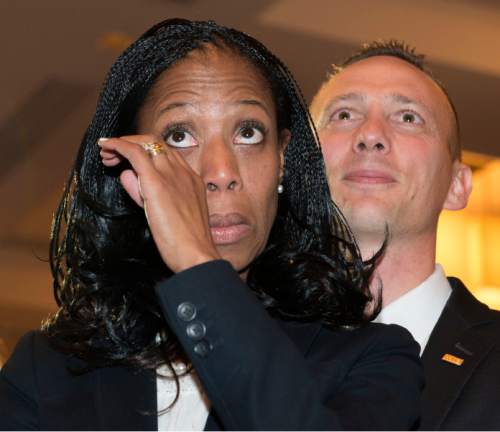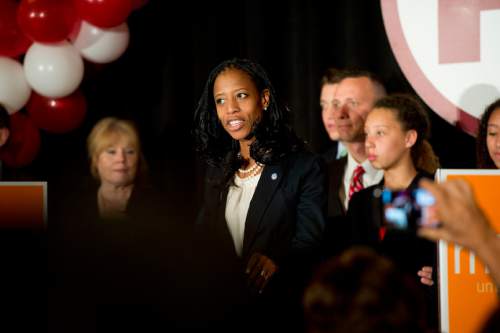This is an archived article that was published on sltrib.com in 2014, and information in the article may be outdated. It is provided only for personal research purposes and may not be reprinted.
Mia Love threw everything she could into her 2014 election — nearly two years of nonstop politicking, millions of dollars, and a new campaign team — to push the needle ever so slightly in her direction.
In the end, it was enough, as she turned her 768-vote loss to U.S. Rep. Jim Matheson in 2012 into an unofficial 4,225-vote victory over Democrat Doug Owens on Tuesday.
In the process she made history. She will become the first black female Republican to serve in Congress.
"The naysayers said that Utah would never elect a black Republican LDS woman to Congress," she said Tuesday night. "Not only did we do it, but we are the first, proving that we are not interested in dividing Americans based on race, social status or gender. We are more interested in electing individuals based on honesty, integrity and the values we hold dear."
Love caught her first big break back in December 2013, when Matheson announced he wouldn't seek an eighth House term. It was a shocking twist in what had, up to that point, appeared to be a certain rematch.
"The opponent matters," said Chris Karpowitz, co-director of Brigham Young University's Center for the Study of Elections and Democracy. "An open seat is different than running against an incumbent."
Had Matheson run, according to the Utah Colleges Exit Poll conducted Tuesday, he would have beaten Love handily, 52 percent to 40 percent. With him on the sideline, the race was vastly different.
Doug Owens, an attorney and son of the late U.S. Rep. Wayne Owens, jumped into the fray. But as a relative unknown, he spent months trying to introduce himself to voters. A July poll released by the Owens campaign found 74 percent didn't know him. An independent poll in August reported that 54 percent either didn't know him or had no opinion of him.
Love, on the other hand, was almost universally known within District 4 from her previous headline-grabbing campaign.
That earlier contest also helped her build another advantage. While she struggled to raise money through the early stages of the 2012 race, that changed when she delivered a powerful speech at the Republican National Convention. Overnight, a nationwide fundraising network sprang up.
"By the end of that campaign, once she'd raised over $2 million and spent it against Matheson, it was clear that money wasn't going to be a problem [in 2014]," said state Rep. Dan McCay, R-Riverton, who is part of Love's inner circle. "She could hire full-time, professional staff to work on her campaign, and I think that made a big difference."
She brought in Dave Hansen, a veteran campaign manager who had helped Sen. Orrin Hatch win a seventh term in 2012, and a team of experienced staffers. Love went back to shake that money tree again and again, raising nearly $5 million for her 2014 race — an unprecedented amount for a House contest in Utah.
That cash edge allowed Love to dominate the airwaves and billboards, while still pouring money into organizing and get-out-the-vote efforts.
Owens could not keep pace. Outside groups that funneled millions into the 2012 matchup for Matheson all but abandoned the seat in 2014. The Utah Democratic Party spent on Owens, but it wasn't enough. In the end, the Democratic underdog was outspent by a 7-to-1 margin.
Love was able invest early, organizing a grass-roots network aimed at drawing her supporters to the polls, an ingredient lacking in her 2012 drive.
Love, Hansen & Co. set out a year ago with a meticulous voter-identification project to target Love backers. When absentee and vote-by-mail ballots went out, the campaign started contacting Love loyalists, hounding voters to return their ballots.
Then, 10 days before the election, the campaign unleashed a flood of phone calls. Mainly volunteers and some paid workers placed 45,000 calls to Love supporters.
"We actually exceeded our goal of who we wanted to call," Hansen said. "We ran out of lists, so we just went back and started again on them. It was a massive effort to try to push our voters out."
Love said she reaped the rewards of those efforts Tuesday.
"I didn't know what to expect on election night," Love said in an interview Wednesday with ABC 4 News. "You never know what to expect and who's going to turn out, but we worked really hard to try to get our supporters to turn out, and they came through for us."
In addition to luring voters to the polls, Love's team had to refurbish her image.
After the 2012 race, Love's persona had been shredded by relentless ads from outside groups backing Matheson. A Dan Jones poll released in August found that 43 percent of voters had a negative impression of her.
"Mia was not only running against Doug Owens, she was running against what Jim Matheson pitched her as and was able to identify her as, and that's honestly why I think the numbers were so tight," McCay said. "She was running literally against the shadow of the past."
Early on, Hansen said, the campaign focused on "tamping down the negatives." The message was upbeat. Her billboards, for example, carried the slogan: "Attacking problems, not people." She refrained from launching salvos against Owens or referring to him at all. It was a concerted effort to revamp her beleaguered public perception.
Even with numerous factors breaking her way, Love's victory margin was remarkably slim. "We knew we had to do well in the counties outside of Salt Lake County," Hansen explained, "even though they only comprise about 13 percent of the district."
Love fared better Tuesday in each the counties in District 4 than she did in 2012. In Salt Lake County, where most of the votes were cast, she lost to Owens 51 percent to 46 percent, three points closer than she finished against Matheson. In Utah County, she did five points better. In Juab County, she won by 13 percentage points more than in 2012.
She also kept more Republicans, who crossed over by the thousands in 2012 to vote for Matheson.
Karpowitz said on Trib Talk that he and his colleagues projected that Owens had to win among independents and get about 20 percent of Republicans to break with their party and vote for him.
"It turns out he did great with Democrats, won a majority of independents, but only got about 17 percent of the Republicans," Karpowitz said, based on data gathered by the Utah Colleges Exit Poll. "He needed to pick off more moderate and weak Republicans in order to win."
Damon Cann, a political science professor at Utah State University, said the results could have been different if national Democrats had pumped money into the contest.
"There has got to be [national Democrats] saying, "I wish we'd gotten into this race, because it shouldn't be this close,' " Cann said.
Based on the past two elections, Karpowitz said, there is reason for Democrats to be optimistic that the 2016 race could be close, too.
Love's friends and supporters aren't looking that far ahead now, still basking in Tuesday's down-to-the-wire victory.
"I'm telling you, up until the end, it sure was a nail-biter for me," said state Sen. Deidre Henderson, R-Spanish Fork and a Love friend. "I don't care what it was. She won and I'm thrilled, and I think it's going to be a good thing for the state of Utah."
Twitter: @RobertGehrke





